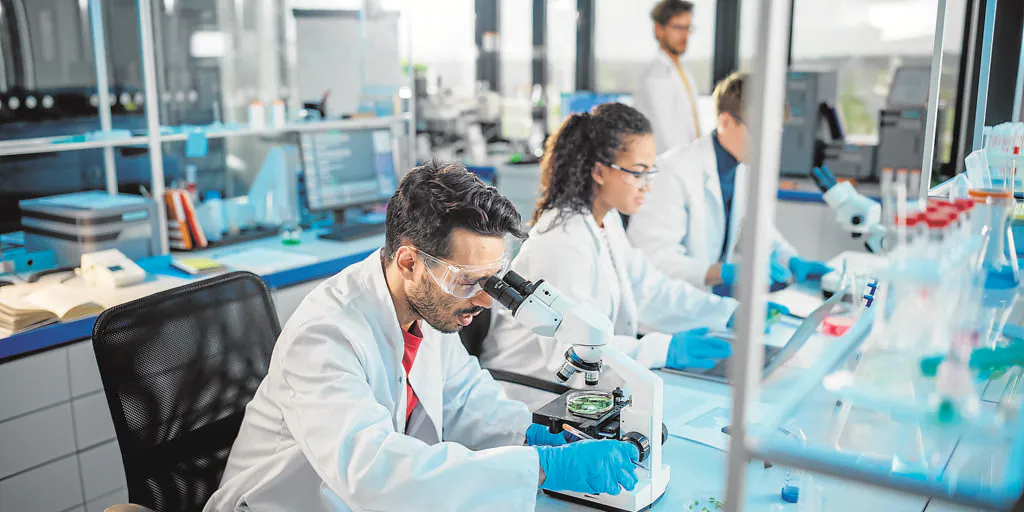Keep
The XXI century Vocational Training is established as a very valid option to face a very competitive international environment. From its full course (six years) to the possibility of ‘hooking’ to Baccalaureate, or as a bridge to university studies, this modality demolishes more and more topics.
Vocational Training it has risen in the 2020-21 academic year by 9.3% compared to the previous. 974,445 students, of which about 20% of graduates in higher cycle access the university, according to data published last Friday by the Ministry of Education and Vocational Training (MEFP).
The Plan for the Modernization of Vocational Training, presented by the Government in July 2020, provides for the creation of 200,000 new jobs in the next four years, with a planned investment of more than 2,000 million euros. And the draft of the Professional Training Law, presented by the Minister of Education, Isabel Celaá, focuses, for example, on aspects such as microformation and recycling, in line with the current (and future projection) of ‘Long Life Learning ‘.
Essential
Clara Sanz, Secretary General of Vocational Training of the MEFP, contributes his opinion on the keys of these new times: «We are witnessing a real revolution of the system in Spain, which aims to make it the dynamic instrument for employability and productivity in companies. For a country to have a powerful economy, it is essential that it have modern, flexible and accessible Vocational Training for all people and, of course, with the ability to adapt to the precise needs of each territory. A path of success, guaranteeing quality employment and continuity within the educational system ».
In this journey, Sanz highlights the commitment to the future law, “which will open a range of training opportunities through creation of offers of different duration and levels. The standard will consolidate the new model, which incorporates the cumulative and creditable recognition of what until now we have called Vocational Training for Employment». An effort in need of contributions from “educational and employment administrations of the Autonomous Communities, social partners, companies, third sector entities linked to Vocational Training, etc.”.
In the case of the Community of Madrid, it faces the next course with more than 6,500 new public squares in 151 centers, with the expansion of 135 groups of the 21 professional families and 23 new Professional Entrepreneurship Classrooms (it can be accessed in any of the six years, or during the three following completion of studies). The group that will grow the most will be Informatics and Communications (32 more groups in the first year), in an environment in which bilingual training is increasing.
Administration and finance, International trade, Web application development, Consumer robotics, Internet of Things architecture, Insurance mediation, Gastronomic marketing, Pharmaceutical dermocosmetics, Interior works, Renewable energies, Decoration and Rehabilitation and Guide in the natural environment and free time … The offer will get bigger and better, within an educational range promoted and claimed.
Great employability
As pointed out Enrique Ossorio, Minister of Education, Universities and Sciences and spokesperson for the Government of the Community of Madrid: «It is one of the priorities for the government of President Isabel Díaz Ayuso. Each year, we have considerably increased the training cycles and students. For the first time, there are more than 110,000 students, a figure higher than those who are studying for Baccalaureate in our region. And we continue to improve the training offer by adapting it to the labor system so that our students have a higher insertion rate ».
Ossorio also highlights the, at the time, pioneering implementation of related programs “such as bilingualism, Dual Vocational Training, a modality in which Madrid registers 25% of students in Spain, or Distance Vocational Training. Precisely, this course we have inaugurated in Alcorcón the reference center that groups the online training offer and the creation of virtual methodological resources (it allows to make the study compatible with work activity or other responsibilities) ».
To the public proposal is added the private contribution, with examples such as, in the case of social health training, ETEE (Escuela Técnica de Enseñanzas Especializadas), an educational center with more than 30 years of experience focused on Higher Level Vocational Training, and in particular on the professional healthcare family. Degrees and double degrees, with disciplines such as Pathological Anatomy and Cytodiagnosis, Clinical and Biomedical Laboratory, Diagnostic Imaging and Nuclear Medicine, Dental Prosthesis and Oral Hygiene.
In the double degree of higher-level training cycle, the option (three academic courses) of Pathological Anatomy and Cytodiagnosis + Clinical and Biomedical Laboratory stands out, which is added to various proposals, in face-to-face or online options, with high rates of employability, both for the training provided and for the agreements with clinics, laboratories, research centers …
In the case of FP Dual, The Chamber of Spain is developing a program to encourage the participation of SMEs, advise them and help them train company tutors. With co-financing from the European Social Fund and the Public Employment Service, has welcomed more than 3,800 SMEs since 2017. “Business cooperation, joint work with the centers and public-private collaboration” are the institution’s coordinates to obtain a level of incidence and development similar to that of the most advanced European countries in this regard.
Chamber initiatives such as the entrepreneurship program e-FP (launched with the Créate Foundation) or the We are FP Dual Ambassadors Network (with the Bertelsmann Foundation and Lidl), they pass on the experiences of students or graduates to young people and their families. What Jonathan Cardenas, with a Middle Degree in Commercial Activities from FEDA Madrid German Business School and who works at Lidl: «Studying a Dual FP has meant a radical change in my life. I was lost, professionally speaking, not knowing what I wanted to work on or if I wanted to continue studying: I looked through thousands of offers and discovered an advertisement from Lidl in which they offered the opportunity to study and do an internship at the same time. I was unaware that this existed and for me it was an opportunity… Here I am, three years later, with my approved degree. By studying it in a private center, I also have the same qualification valid in Germany and a German language certificate. And I’m still at Lidl, where I hold a position of responsibility in my store. “
From the FP Empresa association, a non-profit association of public and subsidized Vocational Training Centers, Luis Garcia Dominguez, its president, underlines the importance of improve orientation in Primary and Secondary, as well as public and private investment: “We need to invest in the centers if we want to get closer and closer, for example, to the level of Germany.”
García Domínguez considers the decision to collect various aspects in an Organic Law to be correct, “such as the creation of a State Register, also think about the entire adult population of the country, establish the advanced modality of Dual FP through a contractual relationship, promote in the centers the figure of the senior expert worker and that of the business prospector, etc. ». And points ways of improvement: «Make explicit the gratuitousness of VET education for citizens (regardless of the offer of private centers); set ratios lower than the current ones; reflect the need for specific teacher training in the center itself (mentoring); a specific educational inspection, etc. ‘ Variables of a type of education, training, increasingly claimed in the XXI century.
– .

